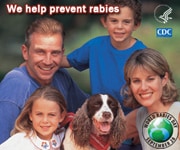Rabies in a Dairy Cow, Oklahoma
Posted: December 23, 2005

On December 22, 2005, the Oklahoma State Department of Health (OSDH) announced that persons who consumed raw, unpasteurized milk or cream sold by the Swan Brothers Dairy located in Claremore, Oklahoma, from December 4 through December 19 may have been exposed to rabies virus.
One of the dairy’s cows was diagnosed with rabies on the basis of testing at the OSDH Laboratory; the diagnosis was confirmed by laboratory testing at the Centers for Disease Control and Prevention (CDC) on December 23. Milk from the rabid cow was combined with milk from healthy cows and bottled prior to sale to the public. Thus, milk sold during December 4-19 may have a low level of contamination with rabies virus. Dairy cheese products do not pose a risk for rabies exposure as none of the milk from the rabies-infected cow was used in cheese products retailed at the dairy.
Most persons who consumed the raw milk or cream are at minimal risk for rabies exposure. Infants and persons with certain medical conditions may be at higher risk; for such persons, a health care provider or the OSDH at 405-271-0980 should be consulted to determine if rabies post-exposure vaccination is indicated. Medical conditions that would place a person at higher risk are those that suppress the immune system, cause abnormalities of the palate, or cause open sores, erosions, or ulcerations in the mouth, throat, or esophagus.
Human cases due to non-bite exposures to rabies are very rare. Scratches, abrasions, open wounds, and mucous membranes contaminated with saliva or other potentially infectious material (such as brain tissue) from a rabid animal constitute non-bite exposures. Inhalation of aerosolized rabies virus is also a potential non-bite route of exposure, but other than laboratory workers, most people are unlikely to encounter aerosolized rabies virus. There are no published studies that have demonstrated the presence of rabies virus in cows’ milk. Although transmission of rabies virus from consuming unpasteurized milk from an infected animal is theoretically possible, no human has ever been reported to develop rabies via this route. Milk that has been heat pasteurized presents no risk for rabies virus transmission.
Additional information about rabies and its prevention is available from the Oklahoma State Department of Health (405-271-0980) and from CDC (404-639-1050 or at http://www.cdc.gov/rabies). The CDC website is updated as new information becomes available.

